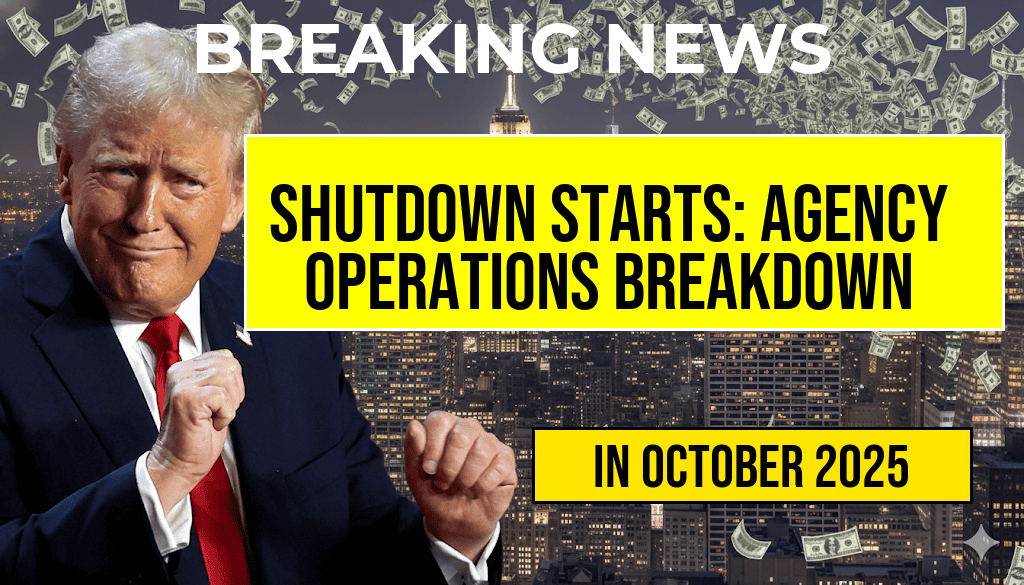The federal government officially entered a shutdown at midnight as Congress failed to pass a funding bill before the deadline. This development halts or limits operations across numerous agencies, affecting millions of Americans relying on government services. While some essential functions such as national security, public safety, and social security payments will continue, many others face delays or complete closures. The shutdown underscores ongoing political disagreements over budget priorities and spending levels, with lawmakers now navigating the immediate impacts and the potential for prolonged disruption.
What Agencies Are Affected and Which Continue Operating?
The impact of the government shutdown varies widely depending on each agency’s funding status and designated essential functions. Agencies with mandatory funding, such as Social Security, Medicare, and the Department of Veterans Affairs, generally continue to operate. Conversely, departments relying solely on annual appropriations face varying degrees of closure or reduced activity. Below is an agency-by-agency breakdown highlighting who remains operational and who faces shutdown-related restrictions.
Agencies Providing Critical Services That Continue Operations
- Social Security Administration: Payments to beneficiaries are scheduled to continue, and frontline staff will process claims, though some offices may operate with limited staffing.
- Veterans Affairs (VA): Benefits processing and healthcare services generally persist, prioritizing urgent cases and emergencies.
- U.S. Postal Service: As an independent agency, USPS maintains normal operations, ensuring mail delivery continues uninterrupted.
- Federal Law Enforcement and National Security Agencies: Departments such as the FBI, Homeland Security, and military operations remain active to maintain national security.
- Transportation Security Administration (TSA): Airport screening and security functions are sustained to prevent disruptions in travel.
Agencies Facing Partial or Complete Shutdown
| Agency | Operational Status | Notes |
|---|---|---|
| Internal Revenue Service (IRS) | Limited | Most services suspended; tax processing delayed, refunds may be postponed. |
| Department of Education | Partially Closed | Most programs halted; federal student aid processing on hold. |
| Environmental Protection Agency (EPA) | Majority Closed | Non-essential activities paused; enforcement and research projects impacted. |
| Department of Housing and Urban Development (HUD) | Partially Closed | Most functions suspended; housing assistance programs delayed. |
| National Institutes of Health (NIH) | Limited | Research grants and non-emergency activities paused or slowed. |
Impacts on Federal Employees and Public Services
Thousands of federal workers face furloughs or unpaid leave, especially those in non-essential roles. Agencies such as the Department of Commerce and the Department of Agriculture have paused many operations, leading to delays in permits, inspections, and data services. Public-facing services like passport processing and federal grant programs are also affected, potentially causing backlogs once funding resumes.
Specific Impact on Social Security, IRS, Defense, and TSA
Social Security
Amid the shutdown, Social Security payments are expected to continue without interruption. The administration has indicated that beneficiaries will receive their scheduled payments as usual, and frontline staff will process claims and inquiries. However, some offices may operate with reduced staffing, making in-person assistance less accessible for those seeking face-to-face help.
IRS
The Internal Revenue Service faces significant operational hurdles. Most taxpayer services are suspended, including processing of returns and refunds. The agency’s website remains accessible for basic information, but complex inquiries and customer service lines are limited. Tax deadlines remain unchanged, but delays in refunds and processing could cause frustration for taxpayers and businesses. The IRS warns that some audits and enforcement activities are on hold until funding is restored.
Department of Defense
Defense operations primarily continue, given their critical nature. Military personnel remain on duty, and ongoing operations in national security are maintained. However, non-essential functions, including some administrative activities and civilian employee pay, face delays or furloughs. Contractors working with the department may experience disruptions depending on their contractual arrangements and funding status.
Transportation Security Administration (TSA)
The TSA continues to operate at airports nationwide, ensuring passenger security remains intact. As a crucial part of the nation’s transportation infrastructure, TSA staffing levels remain stable during the shutdown. Travel disruptions are unlikely in the short term, but long-term funding uncertainties could pose risks to staffing levels and airport security operations in the future.
Looking Ahead: Political Negotiations and Potential Outcomes
The shutdown underscores deep divisions over federal spending priorities. Lawmakers are expected to engage in negotiations to pass a funding bill or extend temporary measures. Historically, government shutdowns have led to economic uncertainty and inconvenience for millions, but some agencies and services are designed to operate through contingency plans. The duration of this shutdown remains uncertain, with some analysts warning that prolonged impasses could deepen disruptions across multiple sectors.
For more information, the [U.S. Government Accountability Office](https://www.gao.gov) and [Congressional Budget Office](https://www.cbo.gov) provide updates on the shutdown’s scope and potential impacts.
Frequently Asked Questions
Which government agencies are still operating during the shutdown?
Several essential agencies such as the Social Security Administration, TSA, and Defense are continuing to operate to provide critical services despite the government shutdown.
Which agencies have halted their operations due to the shutdown?
Many non-essential agencies and departments have suspended their operations. This includes agencies responsible for non-urgent services and administrative functions.
Will Social Security benefits be affected during the shutdown?
No, Social Security benefits will continue to be issued as usual since this program is considered mandatory spending and is protected from shutdown impacts.
How does the shutdown impact the IRS and tax processing?
The IRS has limited staffing during the shutdown, which may delay tax processing and refunds. However, certain services, especially those related to critical operations, will continue.
What should travelers expect at airports and transportation security screening?
The Transportation Security Administration (TSA) remains operational, so airport security screening continues as normal, ensuring travelers face no immediate disruptions.






